From the heart of Britain’s royalty to schoolchildren here
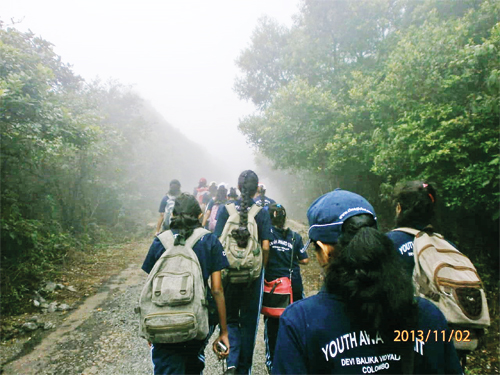
Expedition: Devi Balika girls in Knuckles
The Duke of Edinburgh International Award, it is widely agreed, is Britain’s Prince Philip’s lasting legacy. The scheme, the brainchild of the Prince, husband of Queen Elizabeth II who died earlier this month aged 99, has benefited many young people across the world. First established in 1956 in the UK, it has been operating in Sri Lanka since 1981.
Hasanka Padukka is a shining example of the potential it unlocks. A gold award winner of the Duke of Edinburgh International Award in 2014, Hasanka, a former student of Prince of Wales College, Moratuwa, has gone on to co-found Zero Trash, a waste management service that provides collection, hauling, segregation and transfer of waste to recyclers, and Thuru, an online platform that provides licensed expertise in planting trees around the island.
He was able to gain admission to the Rajarata University in 2006, to read for a Bachelor’s in Business Management, helped by the bronze award he had won that same year.
“The sense of achievement I felt when I completed the bronze level and got into my chosen university never left me; it encouraged me to further challenge myself and aim for gold,” he says.
Hasanka’s biggest achievement is Thuru, which also has a mobile app and enables people to buy saplings and other home gardening products.

Happy memories: Hansamali (above) and Piyumi (below) receiving their awards from Prince Edward in 2018
Like Hasanka’s there are numerous success stories of young people across Sri Lanka for whom the award is making a difference. Hansamali Kaushalya Waththegama and Piyumi Neelakanchana, both of Devi Balika Vidyalaya say they were able to get into the Medical Faculties of the Wayamba and Rajarata Universities respectively on the strength of their performance at the award having initially gained entry to the Dental Faculty of these universities.
The Duke of Edinburgh awards – bronze, silver and gold are geared for children between 13-24, and each level sees them pushed out of their comfort zone taking on competitive sports, aesthetic activities, outdoor-skills building activities and volunteer projects that are organised by the National Youth Awards Units operating in their schools.
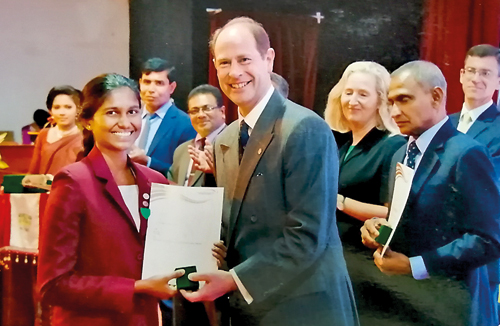 The awards, initially facilitated in Sri Lanka by the National Youth Award Authority has since 2014 been run by the National Youth Award Division of the National Youth Service Council.
The awards, initially facilitated in Sri Lanka by the National Youth Award Authority has since 2014 been run by the National Youth Award Division of the National Youth Service Council.
“The award was Prince Philip’s idea of getting more young people involved in volunteer projects, sports and other extracurricular activities. Sri Lanka is one of around 140 countries which provides opportunities to teens and young adults to take part in this programme,” said National Youth Service Council Director Rashitha Delapola.
Sunil Karunarathna, the NYSC’s deputy director, adds that it is offered through 101 schools in all 25 districts of the country.
The NYSC monitors the activities and projects through its National Youth Award Division and is directly linked to the Duke of Edinburgh Award Regional Centre in Australia, which oversees the entire Asia-Pacific region. More than 11 million students around the world have achieved this award, with almost 40,000 participants from Sri Lanka since 1981, Mr. Delapola said.
Students take part in programmes of voluntary service, physical recreation, skills development, adventurous journeys and at the gold level a residential project, he added.
Voluntary services could be visits to children’s or elders’ homes, tree planting, and tutoring other students. Skills development involves music, art, designing and other related activities while physical recreation sees students engaging in sports or dance training. For the adventurous journey section, students must take part in an expedition (a journey with a purpose) and an exploration (a purpose with a journey).
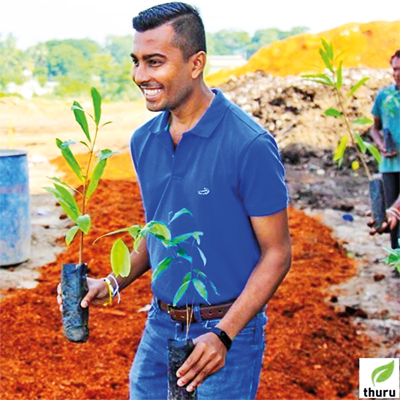
On a green mission: Hasanka Padukka at a tree planting event
The gold level residential project could involve travel to outstation locations and interaction with students from their own schools and other schools. Providing a service to other communities and people and environmental conservation projects are encouraged.
One of the notable aspects of the awards scheme is that it is not competitive. Students are encouraged to develop personal and interpersonal skills within a time frame specific to each level, but not in competition with each other.
Principal of Devi Balika Vidyalaya, Colombo, Pradeepa Samarasinghe said it encourages students to develop their personal and practical skills through volunteer activities, community projects, explorations and expeditions.
“Children from Devi Balika and other schools in Colombo get to travel to rural areas such as Dambana and Girandurukotte to engage in volunteer projects and outdoor activities,” said teacher in charge of the National Youth Awards Unit at the school Rashini Prasanthika who has been organising the activities over the past few years. They continued despite the COVID challenges.
“Right now their progress is monitored through an online record book system, and many of the activities are conducted online, as extra-curricular activities in schools are not being held these days. Last year, the girls held an online programme for the Buddhist Society of the school with guidelines from the Duke of Edinburgh Award Regional Centre in Australia,” Prasanthika said.
“Most of the students in our school are those who gained admission through the grade five scholarship exams. They are good in their studies, but have limited exposure to teamwork, cooperation and practical experience. This programme encourages those skills and values, which will help them in future,” she added.
Hansamali Kaushalya Wattegama from Devi Balika, gave us more details about her experiences as a gold level Duke of Edinburgh International Award winner.
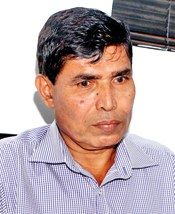
NYSC Deputy Director (Training) Sunil Karunarathna
“Taking part in this programme we gained a lot of experience in contributing towards society. We were given opportunities to provide flood relief to a school in Chilaw, and engage with students from a school in Mahiyanganaya, near the indigenous (Adhivasi) people’s village in Dambana. As a part of our residential project we were able to meet people from the community. This was a rare opportunity,” she said.
Her school mate Piyumi Neelakanchana, who also benefited through the gold level award adds that they also went on shramadana campaigns and visits to elder homes. “Some of these activities were done individually and others were group activities. We were split into small teams or groups on the expeditions and explorations.”
“Miss Rashini, as our Awards Leader, organised training programmes for us in school, before we went on the expeditions and explorations. We learned skills such as map reading at these workshops,” Hansamali said.
Both girls were thrilled to have received their awards at Temple Trees from Prince Edward (son of Prince Philip and Queen Elizabeth) when he visited the country in February 2018 at a ceremony where his wife, the Countess of Essex, then Prime Minister Ranil Wickremesinghe and his wife Maithree Wickremesinghe too were present.
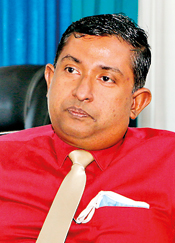
NYSC Director (Technical & Vocational Training) Rashitha Delapola
W. T. Premadasa, a member of the indigenous community, is Awards Leader of the National Youth Awards Division at the Wewatta Maha Vidyalaya in Dambana and has been in charge of the unit at his school for eight years.
“From 2013 rural schools like ours were given the opportunity. Before that only schools within the Colombo district took part in this programme. Our students do not have access to opportunities, unlike students in Colombo schools, and in spite of many difficulties, one student won a gold award a few years ago and three students won silver. Many won bronze awards as well, and many gained admission to state universities,” he says.
“I was happy and proud that our students achieved such national and international recognition. Normally school students don’t get many opportunities to visit Temple Trees and receive an award there,” Mr. Premadasa said.
He is enthusiastic about students from Colombo schools visiting the village in Dambana for further projects and activities.
Even though it is only schools in Sri Lanka that facilitate the Duke of Edinburgh International Award at present, the NYSC’s officials hope to take it further.
“We have signed a MoU with the Education Ministry and the Youth Affairs Ministry. We are also trying to reach out beyond our school network to higher education institutes within Sri Lanka, so undergraduates too can gain both national and international recognition by winning the award at all three levels,” Mr. Delapola said.



